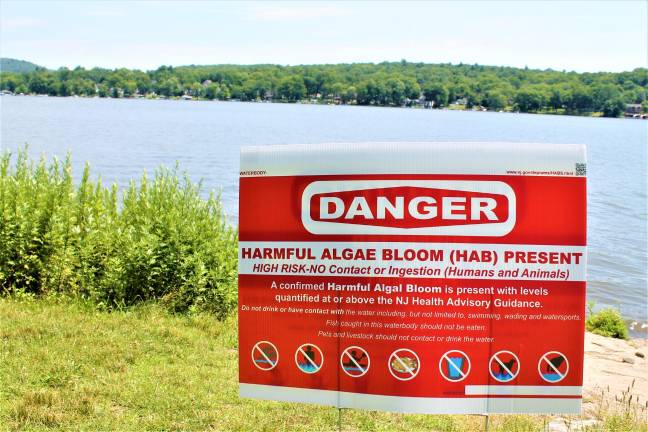NJ DEP denies state senator’s OPRA request regarding cyanobacteria levels
West Milford. The state is not going to tell State Sen. Joe Pennacchio, R-26, why it decided to place no water contact advisories on Lake Hopatcong and Greenwood Lake this summer.

The New Jersey Department of Environmental Protection mostly denied State Sen. Joe Pennacchio’s Open Public Records Act request for documents regarding the decision to place no water contact advisories on Lake Hopatcong and Greenwood Lake this summer.
“If the decisions to issue the advisories that have effectively closed Lake Hopatcong and other New Jersey lakes for much of the summer were based purely on public health concerns, there’s no reason for the (Gov. Phil) Murphy Administration to deny public record requests for internal documents containing discussions of the rationale behind those actions,” Pennacchio said in a press release. “The fact that the governor’s staff refuses to share the deliberative documents that we requested leads us to believe that they have something to hide. Perhaps they don’t want the public to see the political underpinnings of their economically damaging decision to close Lake Hopatcong and Greenwood Lake to recreation, unnecessarily, during prime summer months.”
According to the release, Pennacchio sought emails, texts, letters, “or other correspondence” spelling out why the DEP issued advisories on the state’s two biggest lakes in the busy summer season.
The DEP denied one request, saying the scope was “too broad,” and partially denied, and partially granted another request looking for reports on the blooms by the public during the last three years.
“The DEP is committed to transparency and using science to protect public health and the environment,” Spokesman Caryn Shinske said in an email Thursday. “The DEP’s response and the records provided comply with the New Jersey Open Public Records Act.”
Shinske included the correspondence associated with the requests.
The correspondence included links to the DEP’s website with information on cyanobacteria and also several redacted reports on blooms reported to the agency by the public.
DEP officials have said the agency issued the advisories due to the levels of cyanobacteria in the water.
Once levels rise above 20,000 cells per milliliter of water, the cyanobacteria, evidenced by a blue or green algae “bloom” in the water, can create toxins that can be harmful to humans and especially pets, according to the agency.
Exposure may cause symptoms that include rashes, irritation, headaches, gastrointestinal illness, or in the worst cases, liver or kidney failure, according to the agency.
According to published reports, pets in other states have died following exposure to similar Harmful Algal Blooms.
Local animal care facilities have not reported treating any pets for this in the area, however.
As a result of testing, the DEP issued advisories in June and mid-July to the state’s largest two lakes, Lake Hopatcong and Greenwood Lake.
While those advisories did not officially shut down activities on those water bodies, several public and licensed swimming areas were closed by order of the New Jersey Department of Health.
In the case of Greenwood Lake, which lies in two different states, the New York side did not place any advisories or restrictions for activities there.
Businesses impacted on both lakes said the advisories produced significant negative responses and losses.
Current testing on Greenwood Lake shows levels on the New Jersey side well above the 20,000 threshold at eight locations.
Pennacchio has criticized the advisories, saying that using them is a political tactic to further Gov. Murphy’s attempts at passing a “rain tax” that would assess fees based on the amount of storm water runoff generated by residential and business properties.
“The Murphy Administration isn’t saying that documents containing internal discussions about the lake closures and its push for local storm water taxes do not exist, they’re just saying they have no intention of being transparent with lakeside homeowners and businesses who have an interest in knowing the truth,” Pennacchio said in his release. “If everything the governor has done with the lakes is on the up and up and based purely on science, there’s no reason for his administration to keep those internal communications private. Governor Murphy must order his staff to release the documents immediately to prove they have not been playing politics with people’s lives and livelihoods.”
“If the decisions to issue the advisories that have effectively closed Lake Hopatcong and other New Jersey lakes for much of the summer were based purely on public health concerns, there’s no reason for the (Gov. Phil) Murphy Administration to deny public record requests for internal documents containing discussions of the rationale behind those actions." - NJ State Sen. Joe Pennacchio, R-26